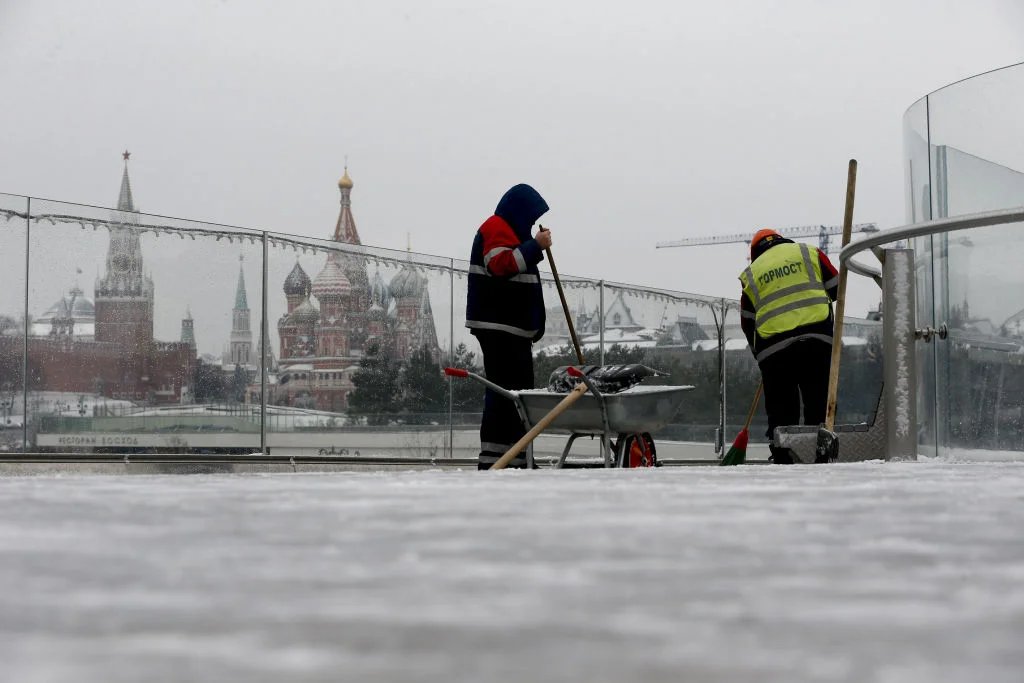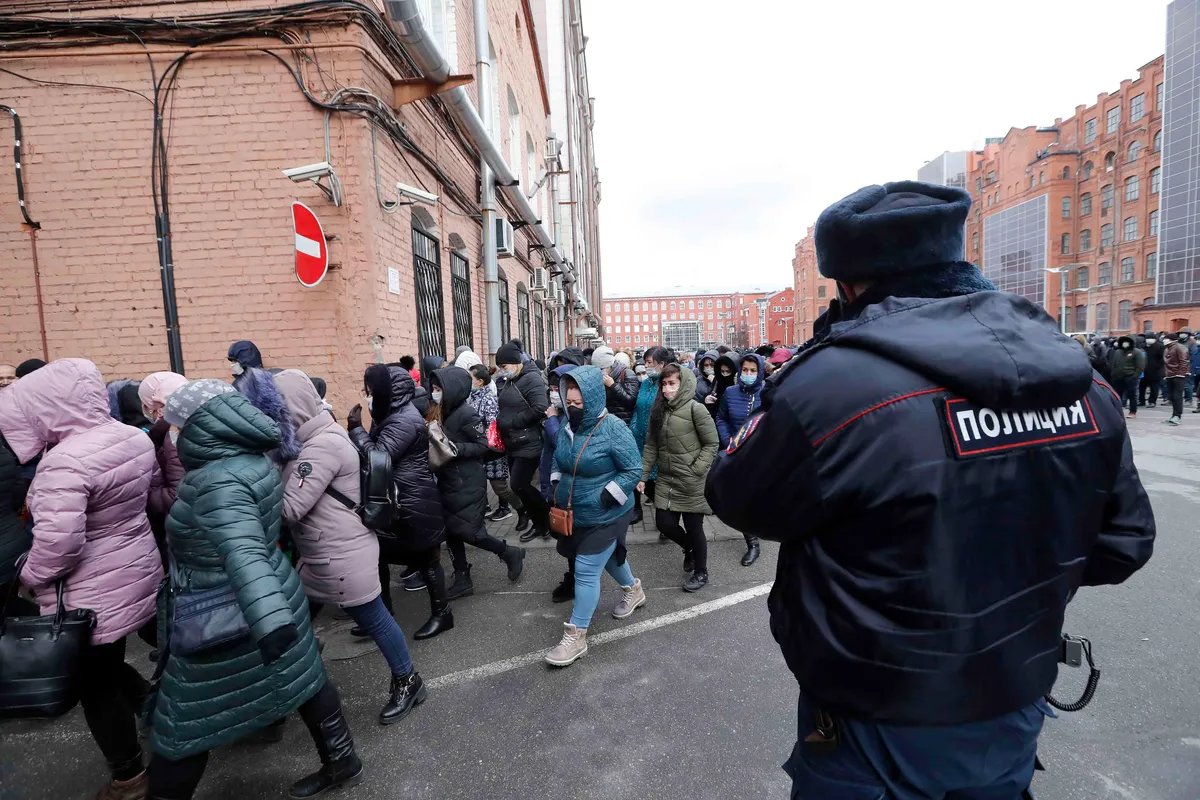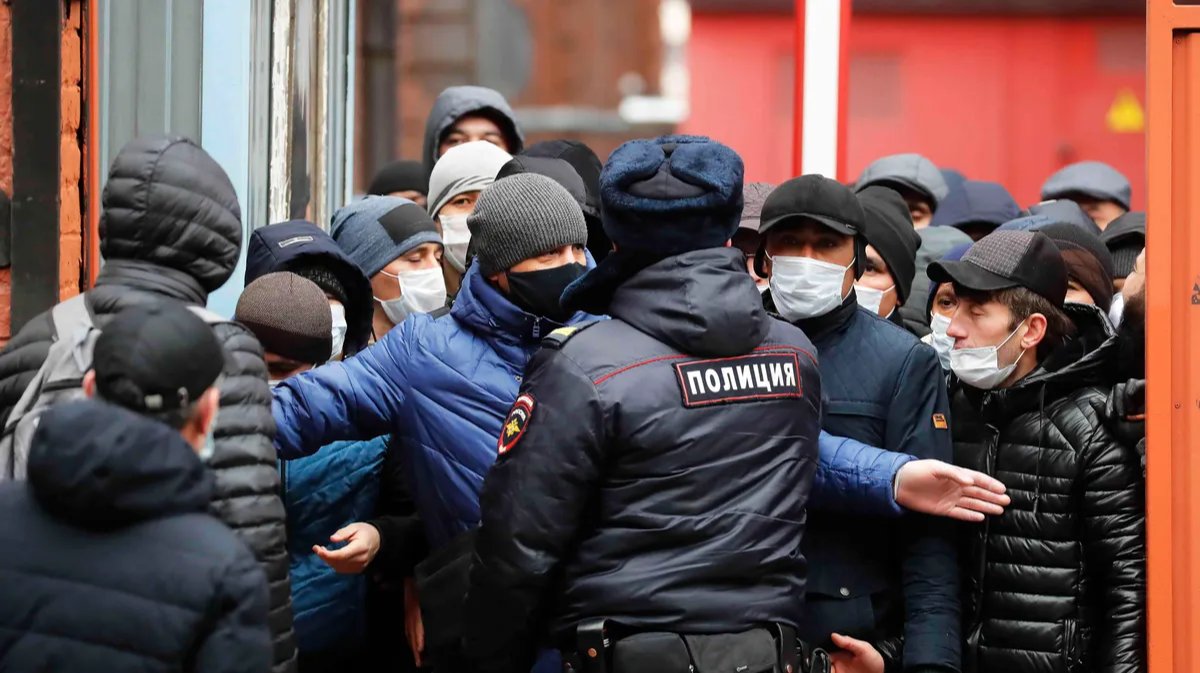For migrants in St. Petersburg, New Years’ Eve turned from a festive holiday to a shocking nightmare. More than 3,000 people — including women, children and the elderly — were detained in the city’s streets and police officers turned up at apartment buildings known to house migrants.
Far from a spontaneous raid, Novaya Europe ascertained, these arrests had been planned for months and were aimed at bolstering Russian troop numbers in Ukraine.
The plan was hatched in August, according to a Novaya Europe source at the Russian Centre for Combating Extremism, a department of the Interior Ministry. Police in Gatchina, a town 45 kilometres from St. Petersburg, had detained members of a criminal group who were granting people residence permits and even Russian passports.
An inquiry, for which searches of apartment buildings where migrants lived were carried out, revealed that employees of government agencies had been involved in the scheme. Illegal immigration to Russia hadn’t decreased, it had just been disguised as legal immigration.
After the full-scale invasion of Ukraine, the State Duma adopted laws that simplified the process for obtaining Russian citizenship, hoping that Ukrainians who had fled to Russia would apply for Russian passports. However, most Ukrainians who wanted to become Russian citizens had already done so between 2014 and 2022. Instead, Central Asian immigrants began to take advantage of the new scheme.
Rashid T, from Uzbekistan, told Novaya Gazeta Europe that he obtained Russian citizenship in 2020, after more than 15 years of working as a labourer, a foreman and a construction site manager in Russia. The process was arduous and expensive. But after February 2022, Rashid said, “it became much easier to get not just temporary registration and a temporary work permit, but also Russian citizenship”.

Photo: Sefa Karacan / Anadolu Agency / Getty Images
In addition to the 3,000 illegal immigrants that the Gatchina enquiry uncovered, Rashid said that many others acquired Russian passports through friends and connections in Federal Migration Service offices elsewhere in the greater St. Petersburg region.
Even when the newly minted Russian citizens found they were being conscripted — which came as a surprise — Rashid said that as Russian military personnel are paid substantially higher salaries than workers in other fields, some conscripts had actually been “happy” to get the chance to “earn a lot of money right away”.
Many of these conscripts were quickly disillusioned, however, Rashid said, recalling the case of a relative who had ultimately received just 200,000 rubles (€2,000) of the 5 million rubles (€50,250) he was supposed to be paid in the first six months. He’d been obliged to spend much of his initial salary on equipment and clothing, and his commanding officers illegally pocketed much of the rest.
“The prosecutor’s office is in on it, so where can you turn?” Rashid said. “Who will listen to a Central Asian anyway?”
Other Central Asian immigrants, hearing stories like these, have changed their minds about conscription. Some have taken their new Russian passports and headed back to their home countries, where economic conditions are worse but at least they won’t get drafted. For others, the back-door nature of the citizenship process seemed to offer its own kind of protection. Because the “registration address” listed in the passports of some of these new Russian citizens is, in many cases, not their actual address, some migrants feel safe. How will the conscription office find them?
The New Year’s raid sought to address that discrepancy by tracking down migrants to where they were actually staying and conscripting them then and there. The August investigation in Gatchina had led to a special meeting at the head office on the topic of illegal migrants, according to a Novaya Gazeta Europe source in the St. Petersburg directorate of the Interior Ministry.
“The meeting took place amid rumours about a second wave of mobilisation,” the source told Novaya Europe. Those at the meeting discussed how to muster the 7,000 “volunteers” that the Kremlin had requested from St. Petersburg, and although they agreed that rounding up migrants would be “inappropriate”, the source said, they did discuss how to collect information about buildings and neighbourhoods where Central Asian migrants were known to live.

Photo: EPA-EFE / ANATOLY MALTSEV
The source said this part of the operation was unofficially called “Azamat”, a word used in the Caucasus to refer to a hotshot or stellar horseman, suggesting that the true purpose of the operation was not to crack down on illegal migrants in Russia but to find “stellar horsemen” to serve in the army in Ukraine.
Anti-extremism officers targeted communal apartment buildings in St. Petersburg where they knew many Central Asian migrant workers and their families lived, the source said. Reasoning that more people than usual would be gathered to celebrate the holidays, they decided to conduct the raids on New Year’s Eve.
The officers cordoned off entire streets in these areas as people were gathering to celebrate and watch fireworks. Then they detained crowds of people, many of them still wearing New Year’s costumes, and forced them onto waiting buses. In total, more than 3,000 people were arrested, with women and children sent to lower security petty crime detention centres, while men were sent to criminal pre-trial detention centres run by the Interior Ministry.
The following morning, army recruiters came to the centres and urged the men to join to army, promising people without citizenship that they would receive Russian passports upon the completion of their service and warning people who hesitated that if they did not agree to sign contracts, their entire families could be deported from Russia and legal proceedings would be opened against them for violating migration legislation.
On 1 January, 31 administrative cases were opened against people for violating migration laws. Of the 31 accused, 27 were fined and given deportation orders.
By the evening of 1 January, 1,500 detained men had already signed contracts with the Ministry of Defence, the source told us, adding that the higher-ups in Moscow had been pleased with the results of the raid. Similar holiday raids in other regions of Russia can reasonably be expected in the future.
Join us in rebuilding Novaya Gazeta Europe
The Russian government has banned independent media. We were forced to leave our country in order to keep doing our job, telling our readers about what is going on Russia, Ukraine and Europe.
We will continue fighting against warfare and dictatorship. We believe that freedom of speech is the most efficient antidote against tyranny. Support us financially to help us fight for peace and freedom.
By clicking the Support button, you agree to the processing of your personal data.
To cancel a regular donation, please write to [email protected]

